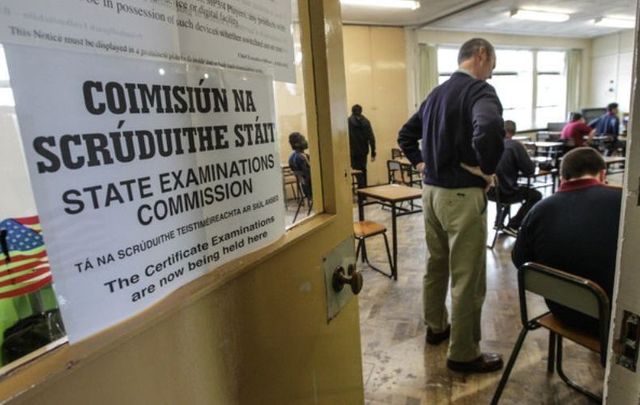There is an apocryphal story told of a school principal herding a bunch of students onto a bus after visiting a training center for craft workers and apprentices and telling them, rather sternly, that if they didn’t study hard “this is where they would end up.”
It’s a story that speaks to an innate Irish snobbery when it comes to post-high-school education choices, and I’m reminded of it this time of year as Irish students prepare for end-of-school exams.
The early weeks in June signal the culmination of five years of schooling for the typical Irish secondary school (high school) student. It is also a time when grown adults are revisited with disturbing memories and dreams, causing cold sweats, temporary panic, and a sense of what might have been.
It can cause us to think and speak in what English grammar experts call the third conditional when we contemplate about something in the past that did not happen, but if it had happened how life would have been different, if only.
It is the time of year for the Leaving Cert (LC), the Irish state exam taken by students that sets in train for tens of thousands of young people the trajectory of their future occupation and life plans.
It’s a high-stakes exam that is taken in early summer each year which, along with careers, influences teaching styles, subject choice, and most controversially, school league tables. These tables are a sensitive topic for schools that have serious misgivings about having so much judged by a single criterion, namely how well students do in the LC.
Be that as it may, the information is used by well-off parents to decide which school to send their kids to. This choice is then usually supplemented with expensive private grind schools that further prepare students for the LC.
Money talks, as research has confirmed the inherent bias in the exam. Not surprisingly, it has shown that wealthier students are favored, thus guaranteeing socioeconomic divisions in access to third-level education.
Business, finance, and engineering programs have higher proportions of well-off students, with up to 40 percent of enrollments in medicine education coming from “affluent” backgrounds.
While Covid led to a two-year hiatus in the exam system, it’s back to normal this year, with the media giving the 360° treatment to each individual exam paper with commentary by students, teachers, and subject matter experts. It all feeds into an unhealthy obsession with what is euphemistically called the “points race.” Despite warnings from psychologists about stress and the mental well-being of teenagers, the message is clear: the LC matters. A lot.
The prize for most is a place in a university of choice doing a course of study they want to pursue. Places are allocated on the basis of points awarded for LC results.
But not all universities are equal, with the most sought-after colleges having higher entry-level requirements. So, for instance, a law degree in Trinity College Dublin required 590 points last year while one in Galway required 542 points.
That is not in any way a reflection on the degree itself but rather a working through of the basic laws of supply and demand. It’s estimated that there will be 80,000 applicants for approximately 55,000 places at third level next year.
But therein lies the dilemma for Irish education and a system that puts such emphasis on a single exam. A pathway to higher education continues to fail the economy with ongoing claims that the system is not fit for purpose.
Ireland currently has an acute labour shortage in a variety of industries, and it looks in vain to the third level education sector to come to the rescue. A recent survey on sectors reporting skills shortages found that almost half of information technology and engineering firms had difficulty filling roles. A further 26 percent in construction experienced similar problems.
This is at a time when Ireland never had more university graduates with 2020 seeing the largest number of graduates, 81,461, in a single year.
Industry leaders continue to argue for stronger engagement between industry and higher education institutes, but in truth, the problem starts in secondary education and most probably even sooner with parents.
With such an emphasis on university qualifications, other routes to work and a career have been sidelined. In particular, apprenticeships which have been the entry point into employment in the craft-based sectors have been undersold and undersubscribed.
Ireland has a long history of providing apprenticeships, an on-the-job as well as off-the-job education or dual training as it’s known as in North America. These courses have traditionally focused on the construction, manufacturing, and motor industries and include carpenters, bricklayers, and motor mechanics. That list has been extended to include business and hospitality workers along with other sectors.
Read more
In other thriving economies, in particular Germany, this system has provided highly skilled, highly paid, workers who have learned not just skills but also responsibility.
The Irish government is aware of the challenges of creating an education system more responsive to the needs of the nation. A sophisticated education architecture has been created involving skill advisory services, and “expert” committees driven by ubiquitous government reports and plans.
Leading the drive is Education Minister Simon Harris, who admitted last month that young people in Ireland were facing far too much pressure when it comes to accessing third-level education.
Nothing new there minister; identifying the problem was always going to be the easy part. Dealing with it, though, will take time as any alternative will need to gain the trust of students, parents and school principals.
In particular, concerns about the perceived low status of apprenticeships need to be addressed. However, credit where it is due and we are moving in the right direction with new apprenticeships being announced on a regular basis, the latest being in the logistics and accounting sectors.
The school bus of the future will, it is hoped, call to the training center not to dismiss the options available but wholeheartedly embrace them. When that happens and the demons of the Leaving Cert have finally been slain, we can all hope for a good night’s sleep come this time of year.
*This column first appeared in the June 15 edition of the weekly Irish Voice newspaper. Michael O'Dowd is brothers with Niall O'Dowd, founder of the Irish Voice and IrishCentral.




Comments